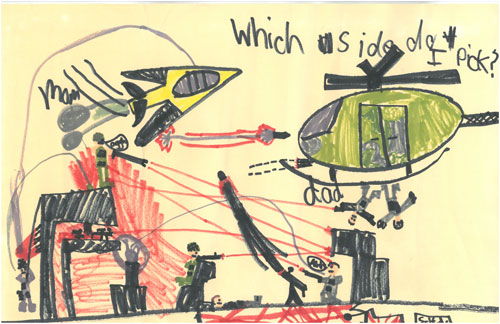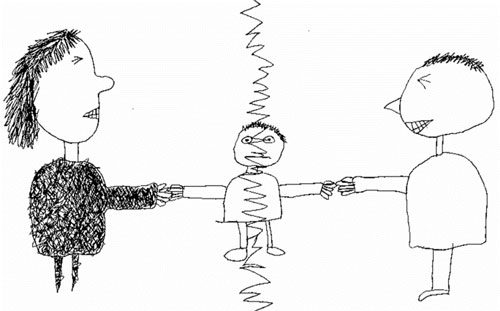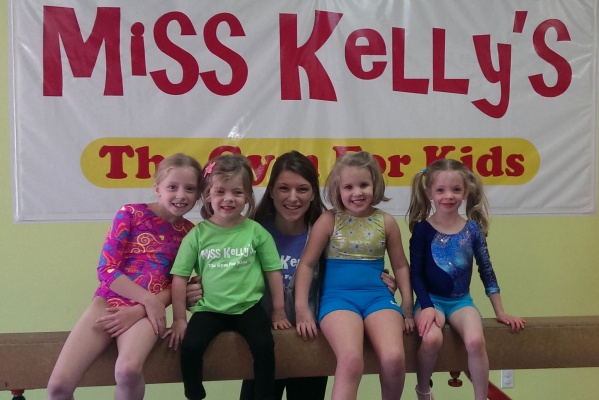When a child learns of their parents’ separation or divorce, the life they knew suddenly becomes unrecognizable. One parent moves out, they bounce from house to house, and eventually, new people enter the picture, trying to find their own place in the family.
While these changes can leave a kid’s head spinning and their heart broken, if their parents are on the same page regarding their care, they can ease the pain and confusion that tugs at their child’s emotions. But knowing just how to help their kids in this new normal can be overwhelming to two people coming to terms with their own hurt and frustration.
Since 1977, Kids In The Middle (KITM) has been the support system families need, empowering children and their parents during and after divorce through counseling, education and support. Through KITM’s multidimensional approach to care, families can come out stronger than ever — even when a marriage has broken apart.
A focus on kids, care for the whole family
According to Katy Walter, chief executive officer of KITM, the impact of divorce on a child isn’t always apparent to their parents. Whether a separation is amicable or rife with conflict, the struggles children face need to be addressed to help them move forward.
“How children react to divorce often depends on their age, but especially with younger kids, they may display lots of anger, regression, feelings of guilt, and sadness,” she explains. “Older kids often keep their feelings bottled up inside. Sometimes parents with older kids think they’re doing OK, but what’s happening is that they’re internalizing their emotions. But overall, most kids are experiencing grief from the loss of their family unit.”
Because every situation is different and every child unique, KITM focuses on a whole family approach to care. And that starts by having a therapist meet with each family member one-on-one so they can get a comprehensive assessment before developing an individualized service plan.
Says Walter, “These plans are so important, especially today when we’re seeing more unique family situations. We have families who have never been married, more same-sex couples, and more parents who are separated but still live together because of financial reasons. There are also those families who are ‘nesting,’ where the kids stay in the household, and the parents move in and out.”
In most cases, a plan includes individual and group counseling sessions for kids, and if needed, individual therapy, joint co-parenting sessions and co-parenting peer groups for moms and dads. KITM also offers family counseling, blended family counseling, and beginning later this spring, an eight-week parenting skills class.
Just as important, KITM understands the financial toll of divorce, and therefore, never turns away a family based on their inability to pay. Last year, KITM served more than 1,500 children, and 90 percent of the clients they see receive some level of financial assistance.
Tips for creating a healthier future following a separation
- When parents decide to separate, there’s no way to completely prevent a child’s pain when they hear the big news, but there are steps moms and dads can take to make it hurt less. Walter recommends that parents keep the following in mind when divorce is on the table.
- Find a common ground. According to Walter, parents whose behavior and communication are highly conflictual have a greater negative impact on their children's well-being. A KITM therapist can help parents build those co-parenting skills needed to keep disputes in check.
- Let kids be kids. A huge concern experts see is parents placing their kids in the middle of their battles. "Kids are already feeling torn between both parents' households," said Walter. "Parents shouldn't ask children to be a messenger or make them choose who they want to live with. Oversharing is something else we hear a lot –kids know a lot of adult information they don't need to be privy to."
- Take care of yourself, too. Parents need to put their children first, but they shouldn't forget about their own emotional well-being. When they receive the support they need, they can better care for their kids and respond to their physical and mental health needs.
- Keep school in the loop. Walter notes that teachers and school counselors can be a good support system for families, especially by making parents aware of any concerns they see. She encourages parents to share information with school leaders to the extent they feel comfortable.
- Help your kids feel safe and secure. "It's a very common fear for kids to feel that because one parent left the house, the other parent may leave, too. Lots of hugs and reassurances go a long way in helping a child adjust to this new situation.
Finally, don’t be afraid to reach out for help before you announce your news. While it focuses on therapy, KITM also offers informational consultations to help parents understand what to expect, how to break the news to their children, and what services they can obtain at KITM to help their children emotionally today and in the years to come.
Says Walter, “Our end goal at KITM is to have the family unit be something where kids can move freely back and forth between two households without feeling torn, feel emotionally safe and healthy, and know they can have a safe and loving relationship with both parents.”
How you can help create stronger families in St. Louis
Because KITM ensures any family in St. Louis can access the care they need, the organization depends on the generosity of its supporters and donors. On July 18, 2020 KITM will host the 2020 Un-Gala: A Celebration of Childhood at the Ameristar Casino Resort & Spa in St. Charles.
While featuring familiar gala highlights, like incredible food, live and silent auctions, and great entertainment, the night also includes life-size versions of the games KITM therapists use in children’s counseling sessions.
“For example, our therapists use Jenga as a conversation starter with our kids,” explains Brittni Snidle, marketing and development manager for KITM.“When a child pulls out a piece, it has a topic therapists can use as a talking point. By giving guests a chance to play this big Jenga game, we can explain how we incorporate games and fun into a child’s therapy. At KITM, we’re really focused on giving kids back their childhood and help them realize they don’t have to worry about adult problems.”
Main photo and children's artists' renderings courtesy of Kids in the Middle.


























